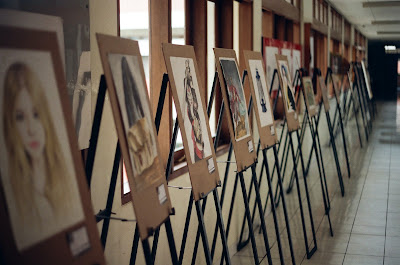Protecting Your Art and Your Wallet: An Art Scam Protection Guide
 |
| Photo by Nataliya Vaitkevich |
Hello, fellow artist and art buffs!
We all know that the world of art can be as alluring as it is treacherous. While we're busy curating our spaces with beautiful masterpieces, there are scams out there waiting to exploit our passion. In this blog post, we'll explore various scams targeting artists and art lovers, and I'll share some valuable tips on how to avoid falling victim to them.
1. The Fake Art Dealer Scam:
One of the most common scams in the art world involves fake art dealers. These individuals pose as experts, promising exclusive art pieces at unbelievable prices. To protect yourself, always research the dealer's reputation, ask for references, and be wary of deals that seem too good to be true.
2. Art Auction Fraud:
Online art auctions can be exhilarating, but they can also be a breeding ground for fraud. Ensure you're dealing with reputable auction houses, read the fine print, and never rush into bidding without thorough research on the artwork and the seller.
3. Phony Art Exhibitions:
This is one that I have recently fallen victim to.😭 A "company" reached out to me on Instagram asking if I would like to be apart of their artist showcase. I checked out their Instagram account and saw that other local artist that I followed also followed their account. They had also tagged other artist who had been in their previous shows on their post. So I thought they were legit. I paid the vendor fee (a whopping $150!). As we got closer to the show date, I noticed the organizer's IG account had not been advertising the show and there was no communication about set up time, parking (the event was supposed to be held in the heart of midtown Atlanta), or anything. I reached out to the organizer to get insight on these things and guess what they said? "The event has been postponed until October 21st." At no point in time had anyone sent any correspondance about this and it was a week before the original show date. As soon as I asked about a refund, all communication from them stopped. In hindsight, I should have done a better job with vetting them. Always be cautious of invitations to participate in art exhibitions that require upfront fees. Though there are legitimate art exhibitions that require artists to pay for the privilege of showcasing their work (usually to offset the price it cost the organizer to rent the space for the show), there are plenty of fake ones out there. Always verify the exhibition's credibility and purpose before committing.
4. Art Authentication Scams:
Before buying a piece, ensure it comes with proper documentation and certification of authenticity. Some scammers create fake certificates or misrepresent the provenance of artwork. Do your due diligence to verify the authenticity of the piece.
5. Overpayment Scams:
If you're selling your art, be aware of overpayment scams. Scammers send checks or money orders for more than the agreed amount, asking you to refund the excess. The original payment is usually fake, and you'll lose your art and your money. Only accept payments from trusted sources. This is also a very prevalent Instagram scam. A "buyer" will contact you wanting to commission you for a portrait (usually a pet portrait for their son or daughter). They will be insistant on paying you directly via PayPal instead of you sending them an invoice. They will tell you they are having technically difficulties making the payment and will tell you that PayPal will be sending you a confirmation code to verify that payment and that you need to send it to them. They are actually trying to hack into your account and change your password. To I avoid these scammers and filter out the actual potential clients, I always direct anyone messaging me about a commission to my Commission Request Form on my website. Scammers 100% of the time leave the conversation at that point.
6. Social Media Shenanigans:
With the rise of social media, scams are taking new forms. Beware of suspicious messages from supposed art buyers, and be cautious about sharing personal or financial information online. Always meet potential buyers in safe, public places. Or, an even safer option, is to ship the art to them and charge them a shipping fee.
7. Online Copyright and Image Theft:
 |
| Photo by GuerrillaBuzz on Unsplash |
Protect your digital art by watermarking your images and using copyright symbols. Another option is to only post low resolution images of your artwork online. Regularly search for your art online to ensure it's not being used without your permission. If you find copyright violations, take action to protect your work.
As proud, art-loving, women and artists, we deserve to enjoy the world of art without the fear of falling victim to scams. Being vigilant, doing your research, and trusting your instincts are key to avoiding art-related scams. Remember that a discerning eye and a dash of skepticism, can be your best allies in navigating the art world safely and confidently. Stay fabulous, stay informed, and keep adorning your life with the art that speaks to your soul.
- Carla



Comments
Post a Comment